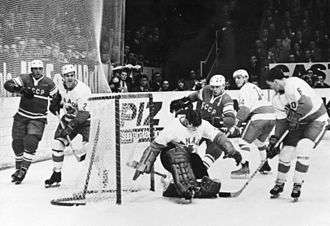1967 World Ice Hockey Championships| Tournament details |
|---|
| Host country |
 Austria Austria |
|---|
| Dates |
18–29 March |
|---|
| Teams |
8 |
|---|
| Final positions |
|---|
Champions  |
 Soviet Union (7th title) Soviet Union (7th title) |
|---|
Runner-up  |
 Sweden Sweden |
|---|
Third place  |
 Canada Canada |
|---|
| Fourth place |
 Czechoslovakia Czechoslovakia |
|---|
| Tournament statistics |
|---|
| Matches played |
28 |
|---|
| Goals scored |
205 (7.32 per match) |
|---|
| Attendance |
172,800 (6,171 per match) |
|---|
| Scoring leader(s) |
 Anatoli Firsov 22 points Anatoli Firsov 22 points |
|---|
|
|

USSR-Canada 2:1 game on 27 March
The 1967 World Ice Hockey Championships was the 34th edition of the Ice Hockey World Championships. The tournament was held in Vienna, Austria from March 18 to March 29, 1967. For the fifth straight year, the Soviet Union won the tournament. They won all their games claiming their seventh World championship, and eleventh European. The competition for the other medals was very close, with Sweden, Canada, and Czechoslovakia all being in contention until the end. Sweden defeated Canada on the final day to clinch a medal and claimed Silver when the Czechs lost to the Soviets in the final game. Canada claimed Bronze, losing out to Sweden on the head-to-head tie-breaker. The East Germans handily defeated the West this year, which was believed to have settled who would be relegated. However, starting in 1969, the top tier shrank to only six nations meaning that both German entries ended up being relegated. The tournament also featured an historic first, when Finland defeated Czechoslovakia.[1]
In Group 'B' the championship was settled on the final day. With one game to play, both Romania and Poland had ten points, both had a goal differential of +14, and they had tied each other, so whoever won their final game by a wider margin would claim tournament victory. The Romanians defeated Yugoslavia five to three, and then had to watch as the Poles defeated Austria seven to two. The Polish team were quite fortunate that Romania had blown a lead on the second last day against Austria, but were very unfortunate that the change in the top tier format allowed for no promotion from Group 'B' Oddly, the leading scorer (Zoltán Horváth) came from the last placed team, Hungary. Japan won all four of their games by wide margins to claim Group 'C' but had to wait (like Poland) until 1969 for another chance to move up.
World Championship Group A (Austria)
Final Round
Both East and West Germany were relegated as the top tier shrank to six nations for 1969.
World Championship Group B (Austria)
Final Round
Both Switzerland and Hungary were relegated to the 'C' pool for 1969, additionally they missed qualifying for the 1968 Olympics. No one was promoted.
World Championship Group C (Austria)
Final Round
| Place |
Team |
Matches |
Won |
Drawn |
Lost |
Difference |
Points |
|---|
| 17 |  Japan Japan | 4 | 4 | 0 | 0 | 46 - 08 | 8 |
| 18 |  Denmark Denmark | 4 | 2 | 0 | 2 | 18 - 23 | 4 |
| 19 |  Bulgaria Bulgaria | 4 | 2 | 0 | 2 | 17 - 17 | 4 |
| 20 |  France France | 4 | 1 | 0 | 3 | 18 - 21 | 2 |
| 21 |  Netherlands Netherlands | 4 | 1 | 0 | 3 | 19 - 49 | 2 |
|
With the top level shrinking, no one was promoted but Japan earned a trip to the Grenoble Olympics. Belgium, Great Britain, and North Korea were expected to play in this tournament, but did not participate.[1]
Ranking and statistics
| |
Tournament Awards
- Best players selected by the directorate:
- Media All-Star Team:
|
Final standings
The final standings of the tournament according to IIHF:
European championships final standings
The final standings of the European championships according to IIHF:
Citations
References
- Summary (in french)
- Duplacey, James (1998). Total Hockey: The official encyclopedia of the National Hockey League. Total Sports. pp. 498–528. ISBN 0-8362-7114-9.
- Podnieks, Andrew (2010). IIHF Media Guide & Record Book 2011. Moydart Press. pp. 140–1.
- Szemberg, Szymon; Podnieks, Andrew, eds. (2007), World of Hockey: Celebrating a Century of the IIHF, Bolton, Ontario: Fenn Publishing, ISBN 1-55168-307-5
